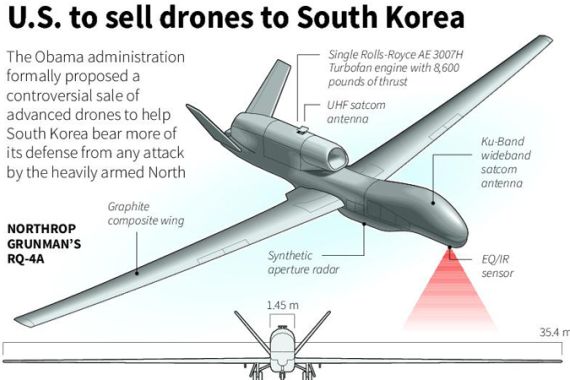US proposes sale of spy drones to S Korea
Arms-control advocates fear $1.2bn deal for “Global Hawk” aircraft could fuel instability and stir regional arms race.

The administration of US President Barack Obama formally proposed a controversial sale of advanced spy drones to help South Korea bear more of its defence from any attack by the heavily armed North.
Seoul has requested a possible $1.2bn sale of four Northrop Grumman Corp RQ-4 “Global Hawk” remotely piloted aircraft with enhanced surveillance capabilities, the US Defence Security Cooperation Agency said on Tuesday.
The formal notification to US Congress came less than two weeks after a North Korean space launch of a satellite, which was roundly condemned by the United States as a “highly provocative act”.
South Korea needs such systems to assume top responsibility for intelligence-gathering from the US-led Combined Forces Command as scheduled in 2015, the security agency said.
“The proposed sale of the RQ-4 will maintain adequate intelligence, surveillance, and reconnaissance capabilities and will ensure the alliance is able to monitor and deter regional threats in 2015 and beyond,” the statement said.
The United States has agreed with Seoul to turn over the wartime command of Korean troops later this decade.
Current arrangements grew from the US role in the 1950-1953 Korean War that repelled a North Korean takeover of the South.
Seoul has shown interest in the high-altitude, long-endurance Global Hawk platform for at least four years.
The system transmits imagery and other data from 18,300 metres at near real-time speed, using electro-optical, infrared and radar-imaging sensors.
The possible sale has been held up by discussions involving price, aircraft configuration and a go-slow on release of such technology subject to a voluntary 34-nation arms control pact.
The North is banned from testing missile or nuclear technology under international sanctions imposed after its 2006 and 2009 nuclear weapons tests.
In October 2008, then-US defence secretary Robert Gates told reporters that the United States was “very sympathetic” to South Korea’s interest in Global Hawk. But he cited issues that had to be overcome because of the so-called Missile Technology Control Regime.
The pact, established in 1987, has been credited with slowing the spread of ballistic missiles and other unmanned delivery systems that potentially could be used for chemical, biological and nuclear attacks.
Arms-control advocates fear that this could fuel instability and stir regional arms-race dynamics as well as provide diplomatic cover for an expansion of such exports by Russia, China and others.
If a sale takes place, it would be for the third generation of Global Hawk drones known as Block 30, the security agency’s notice to Congress said.
South Korea’s possible Global Hawk purchase would mark the system’s first sale in the Asia-Pacific region. It has already been sold to the North Atlantic Treaty Organization.